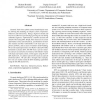Free Online Productivity Tools
i2Speak
i2Symbol
i2OCR
iTex2Img
iWeb2Print
iWeb2Shot
i2Type
iPdf2Split
iPdf2Merge
i2Bopomofo
i2Arabic
i2Style
i2Image
i2PDF
iLatex2Rtf
Sci2ools
125
click to vote
DSN
2007
IEEE
2007
IEEE
Dynamic Fault Tree Analysis Using Input/Output Interactive Markov Chains
Dynamic Fault Trees (DFT) extend standard fault trees by allowing the modeling of complex system components’ behaviors and interactions. Being a high level model and easy to use, DFT are experiencing a growing success among reliability engineers. Unfortunately, a number of issues still remains when using DFT. Briefly, these issues are (1) a lack of formality (syntax and semantics), (2) limitations in modular analysis and thus vulnerability to the state-space explosion problem, and (3) lack in modular model-building. We use the input/output interactive Markov chain (I/O-IMC) formalism to analyse DFT. I/O-IMC have a precise semantics and are an extension of continuous-time Markov chains with input and output actions. In this paper, using the I/OIMC framework, we address and resolve issues (2) and (3) mentioned above. We also show, through some examples, how one can readily extend the DFT modeling capabilities using the I/O-IMC framework.
Related Content
| Added | 02 Jun 2010 |
| Updated | 02 Jun 2010 |
| Type | Conference |
| Year | 2007 |
| Where | DSN |
| Authors | Hichem Boudali, Pepijn Crouzen, Mariëlle Stoelinga |
Comments (0)

